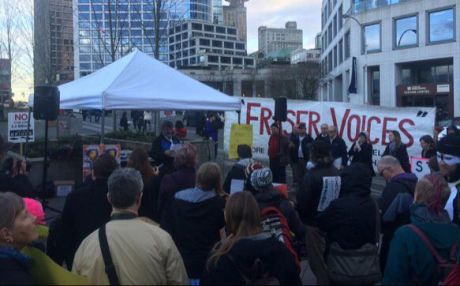Reports
You are here
People’s Climate Assembly, Vancouver

March 15, 2016
On March 3, Prime Minister Trudeau met with provincial and territorial leaders at the Vancouver Convention Centre to begin to develop a national climate strategy.
In order to keep up public pressure on Trudeau, activists in the Vancouver Climate Convergence called for a People’s Climate Assembly outside the Convention Centre, asking people to bring their signs stating what they would like to see included in a people’s climate strategy. Despite the fairly short notice, about 200 people joined the event.
Speakers at the rally included Bob Chamberlin, Vice-president of the Union of BC Indian Chiefs and signatory to the Lelu Island Declaration in support of protecting the Lax Kw’alaams territories on Lelu Island and Flora Banks. Rally participants also heard from Carleen Thomas, who spoke on behalf of the Tsleil-Waututh Sacred Trust Initiative opposing the Kinder Morgan Trans Mountain pipeline project.
Labour speakers included Terry Engler, Vice President of the Vancouver and District Labour Council and President of the International Longshore Workers Union Local 400, who spoke about how capitalism was damaging both the environment and working people’s standard of living. Monica Judd from the Canadian Union of Postal Workers told the crowd about their campaign to transform Canada Post into one of the hubs of a new green economy via their plan Delivering Community Power.
Rally participants also heard from Professor Laura Marks from the SFU climate justice group and Cate Hodgeson from UBC 350. Richmond City Councillor Harold Steves spoke about the problems with the Site C dam megaproject, and organic farmer Kimi Hendess spoke on behalf of Fraser Voices—a group opposing the $3.5 billion Massey bridge megaproject. Rodrigo Samayoa from LeadNow’s national climate petition campaign finished off the roster of speakers.
Some speakers mentioned the fact that Premier Christy Clark had referred to those opposing pipelines as “the forces of No.” But it is she and other provincial and federal governments that have said no to Indigenous rights and a rapid transition to climate jobs. When Indigenous, union and climate activists unite, they are the “forces of yes” for climate justice.
Join the conference Ideas for Real Change: Marxism 2016, including the panels "Climate justice now" and "Colonialism, climate crisis and Indigenous resistance." Register now and join/share on facebook.
Section:










